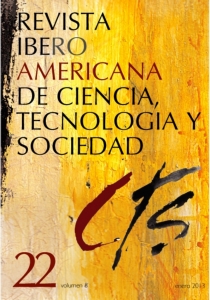Concepciones sobre las Tecnologías de la Información y la Comunicación y sus implicaciones educativas
Un estudio exploratorio con profesorado de la provincia de Ñuble, Chile
DOI:
https://doi.org/10.52712/issn.1850-0013-659Palavras-chave:
concepciones, conocimientos, tecnología, primaria, recursosResumo
El propósito de este estudio fue conocer las concepciones de profesores de educación primaria sobre las tecnologías educativas en dos dimensiones: a) conocimiento de las tecnologías de la información y comunicación; y b) creencias sobre el uso educativo que el profesorado da a estas herramientas. Se opta por un enfoque metodológico cuantitativo y un diseño no-experimental descriptivo del tipo encuesta. El análisis de los datos se realizó mediante paquete estadístico SPSS 14.0 y las técnicas utilizadas fueron descriptivos, frecuencias y porcentajes, técnicas de reducción de datos (análisis factorial) e inferencia estadística (comparación de medias y porcentajes). Los resultados demuestran que la mayoría de los profesores reconocen el interés que las tecnologías despiertan en el alumnado y las oportunidades de aprendizaje que ofrecen principalmente en relación con los diferentes ritmos de aprendizaje y las necesidades educativas especiales. Se identifica la búsqueda de información como una competencia fundamental, así como se evidencia que existe una relación causal entre el nivel de formación, la importancia que el profesor otorga al recurso y el uso educativo. Los resultados hacen aconsejable promover programas de formación continua en esta área y fortalecer la formación inicial docente.
Downloads
Referências
BOZA, A., TOSCAZO, M. y MÉNDEZ, J. M. (2009): “El impacto de los proyectos TIC en la organización y los procesos de enseñanza-aprendizaje en los centros educativos”, Revista de Investigación Educativa, vol. 27, nº 1, pp. 263-289.
BUZHARDT, J. y HEITZMAN-POWELL, L. (2005): “Training behavioural aides with a combination of online and face-to-face procedures”, Teaching Exceptional Children, vol. 5, pp. 20-26.
CABERO, J. (2006): Nuevas tecnologías aplicadas a la educación, McGraw- Hill/Interamericana de España, S.A.U.
CABERO, J. y GISBERT, M. (2005): Laformación en Internet, Editorial MAD, S.L.
CARDONA, M. C. (2002): Introducción a los métodos de investigación en educación, Madrid, EOS.
COLÁS, P. y JIMÉNEZ, R. (2008): “Evaluación del impacto de la formación (online) en TIC en el profesorado. Una perspectiva sociocultural”, Revista de Educación, nº 346, pp. 187-215.
CHACÓN, A. (2003): Teoría y práctica de las nuevas tecnologías en la formación de maestros,Granada, Grupo Editorial Universitario.
FERNÁNDEZ, M. y CEBREIRO, B. (2003): “La integración de los medios y nuevas tecnologías en los centros y prácticas docentes”, Revista Pixel-Bit, nº 20.
GAY, L. y AIRASIAN, P. (2000): Educational Research: Competencies for analysis and application,New York, Merrill/Prentice Hall.
KOZMA, R. y ANDERSON, R. (2002): “Qualitative case studies of innovative pedagogical practices using ICT”, Journal of Computer Assisted Learning, vol. 18, nº 4, pp. 387-394.
MONGE, M. (2005): Aprender y desaprender con nuevas tecnologías,Mira Editores S.A.
PUENTES, A. y ROIG, R. (2008): “Escala de concepciones del profesorado hacia las Tecnologías de la Información y la Comunicación (TIC)”, Documento inédito, Universidad de Alicante.
RODRÍGUEZ, F. (2000): “Las actitudes del profesorado hacia la Informática”, Revista Pixel-Bit,nº 15.
ROIG, R. (2003): La articulación de las Tecnologías de la Información y la Comunicación en la Educación,The Edwin Mellen Press Ltd.
SANHUEZA, S., RIOSECO, M., VILLEGAS, C. y PUENTES, A. (2010): Concepciones del profesorado sobre las TIC y sus implicancias educativas, Primer Congreso Interdisciplinario de Investigación en Educación y Segundo Congreso de Investigación en Educación Superior, Centro de Investigación Avanzada en Educación de la Universidad de Chile y Centro de Estudios de Políticas y Prácticas en Educación de la Pontificia Universidad Católica de Chile.
TIRADO, R. (2002): Los entornos virtuales de aprendizaje Bases para una didáctica del conocimiento, Grupo Editorial Universitario.
VAN MELLE, E., CIMELLARO, L. y SHULHA, L. (2003): “A dinamic framework to guide the implementation and evaluation of educational Technologies”, Education and Information Technologies, vol. 8, nº 3, pp. 267-285.
Downloads
Publicado
Como Citar
Edição
Seção
Licença
Copyright (c) 2024 CC Attribution 4.0

Este trabalho está licenciado sob uma licença Creative Commons Attribution 4.0 International License.
Todas os números de CTS e seus artigos individuais estão sob uma licença CC-BY.
Desde 2007, a CTS proporciona acesso livre, aberto e gratuito a todos seus conteúdos, incluídos o arquivo completo da edição quadrimestral e os diversos produtos apresentados na plataforma eletrônica. Esta decisão é baseada no entendimento de que fornecer acesso livre aos materiais publicados ajuda a ter uma maior e melhor troca de conhecimentos.
Por sua vez, em se tratando da edição quadrimestral, a revista permite aos repositórios institucionais e temáticos, bem como aos sites pessoais, o autoarquivo dos artigos na versão post-print ou versão editorial, logo após da publicação da versão definitiva de cada número e sob a condição de incorporar ao autoarquivo um link direcionado à fonte original.











